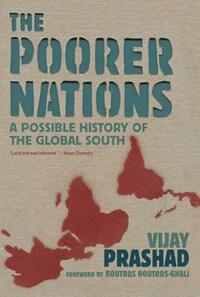Take a photo of a barcode or cover
adventurous
informative
inspiring
I really wanted to like this book, because I'm looking for a good history of global south resistance movements, but I feel like it got a bit too bogged down in details (for my tastes, at least) and lacked much of an overall or within-chapter narrative. Basically, it contains a ton of research and interesting quotes from world leaders at various meetings (lots of Kissinger, the Brandt Commission, the formation of OPEC, etc.) but I had a hard time keeping track of why these quotes were important, in the sense of like "what ideology/movement does this person represent?" or "what country/group of countries is this person referring to with this decontextualized statement?" So yeah, it'd probably be good for someone who already has a good grasp on what all the different Non-Aligned Movement countries were and their coalitions, but without that background I found my eyes glazing over the quotes :(
challenging
informative
reflective
medium-paced
informative
medium-paced
challenging
informative
medium-paced
This book was amazing, well researched, he made an effort to make it understandable for people who don’t know a lot about economics, and his understanding of how these issues are intersectional comes across clearly in the text, I hope he’s working on something new from when the book left off to the present. 100/10 would recommend I took a long time to finish because I learned something new almost every other paragraph and I had to sit and think and write notes about it.
In terms of how much I learned and how thought-provoking I found it, this book gets five stars. The overarching analysis brings the score down a bit, because I feel Vijay falls into the trap of calling everything he's not too keen on 'neoliberalism'. China's development model (being the most important example) is heavily regulated, planned, and is dominated by state-owned enterprises; it doesn't conform to any sensible definition of 'neoliberalism' that I've come across. A couple of other little quibbles here and there, but honestly it's a very interesting book, well worth reading.
I struggled with this book. The idea behind it and the story it was telling were good, and some of the individual details were really interesting. As a polemic and as a spotlight on a situation that needs to be better known in the West, it was covering important ground.
But I didn't get on with the prose. Each chapter was dense with information - too dense much of the time. The flood of events, quotes, and personalities meant it was easy to lose track of what was going on (and I have managed to keep track of some very difficult books in the past). The problem was that a lack of obvious narrative in each chapter meant it was hard to know what was the main point and what was digression.
The best bits stood out and were memorable. The latter half was better than the first half, and the bit about the Zapatistas as an example of the rise of indigenous groups was great, more focused and more readable rather than being an impressive but unengaging collection of notes about everything.
It's worth a look if you want to know something about the global south and its political battles, and don't mind wading through words to get there. I'm glad I got through it, but it was hard work.
But I didn't get on with the prose. Each chapter was dense with information - too dense much of the time. The flood of events, quotes, and personalities meant it was easy to lose track of what was going on (and I have managed to keep track of some very difficult books in the past). The problem was that a lack of obvious narrative in each chapter meant it was hard to know what was the main point and what was digression.
The best bits stood out and were memorable. The latter half was better than the first half, and the bit about the Zapatistas as an example of the rise of indigenous groups was great, more focused and more readable rather than being an impressive but unengaging collection of notes about everything.
It's worth a look if you want to know something about the global south and its political battles, and don't mind wading through words to get there. I'm glad I got through it, but it was hard work.

